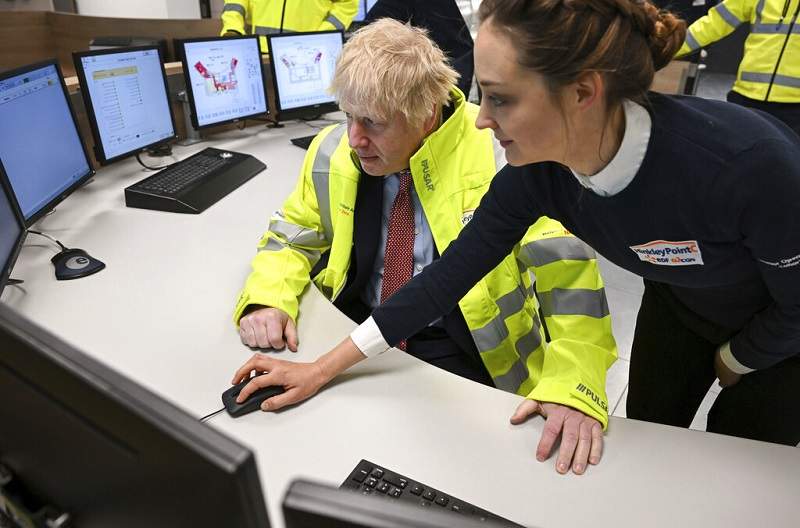
Britain’s Prime Minister Boris Johnson meets staff in the control center training area during a visit to Hinkley Point C nuclear power station construction site in Somerset, England, on Thursday.
11:07 JST, April 8, 2022
LONDON (AP) — British Prime Minister Boris Johnson on Thursday announced plans to build more nuclear power plants, boost renewable energy production and further tap domestic oil and gas reserves to help the U.K. reduce its dependence on Russian energy following the invasion of Ukraine.
Critics quickly panned Johnson’s energy security strategy for focusing almost entirely on boosting supplies while doing little to increase energy efficiency and cut demand. As a result, they said, the plan offers no relief to consumers pummeled by soaring utility bills and risks undermining Britain’s commitment to cut carbon emissions in response to global warming.
“This takes the U.K. backwards not forwards,” said Professor Matthew Paterson, an expert in the politics of climate change at the University of Manchester. “It is a knee-jerk response to the Russian invasion of Ukraine that goes back to old, tired solutions focused on expanding energy supply, and does so in ways that contradict the U.K.’s climate strategy.”
Johnson announced the strategy three weeks after he said Western countries had made a “terrible mistake” in failing to wean themselves off Russian energy following President Vladimir Putin’s annexation of the Ukrainian region of Crimea eight years ago. That emboldened Putin to invade Ukraine in February and left Europe vulnerable to “blackmail” amid Russian threats to cut off energy supplies, he said at the time.
Oil and natural gas prices have soared in recent months, first as demand for energy increased following the COVID-19 pandemic and more recently amid concern that the war could curtail supplies from Russia. High energy prices are fueling a cost-of-living crisis in Britain, where household gas and electricity prices jumped 54% this month.
The government on Thursday responded to these issues with what it called a strategy to boost “long-term energy independence, security and prosperity.”
“This is about tackling the mistakes of the past and making sure that we are set well for the future,” Johnson said at Hinkley Point C, a nuclear power plant under construction in southwest England. “And we are never again subject to the vagaries of the global oil and gas prices, and we can’t be subject to blackmail, as it were, from people such as Vladimir Putin.”
That includes plans to build eight new nuclear reactors by 2050, tripling U.K. production of nuclear energy to 24 gigawatts, or a quarter of projected electricity demand. A key challenge in meeting this goal is the development of as yet unproven technology for small modular reactors that are less than a third the size of existing reactors, the government said.
Paul Dorfman, an associate fellow at the University of Sussex Science Policy Research Unit, was particularly critical of the focus on nuclear power, which is expensive and slow to develop. He described it as a “boys and their toys” response that the government is portraying as a magic solution to the problem.
“The reality is these things will turn out to be white elephants and very, very costly white elephants,” Dorfman told The Associated Press. “There really is no logic to it, especially given the low-hanging fruit to start off with is energy efficiency, demand-side management and energy conservation.’’
In addition, the strategy targets a 10-fold increase in production of electricity from offshore wind farms and an unspecified boost from onshore wind farms in a “limited number of supportive communities.”
Community opposition has curtailed onshore wind projects, which currently account for less than 8% of U.K. electricity generation capacity.
The government also announced a new round of licensing for oil and gas projects in the North Sea, saying these fuels would be key to U.K. energy security and as a transition to low-carbon renewable energy. The government also argued that domestically produced oil and gas would have a lower carbon footprint than overseas energy that has to be transported to the U.K.
Other elements of the strategy include promoting the use of solar power and increasing hydrogen production for use in fuel cells.
Responding to criticism that the plan does little to address the current high price of gas and electricity, Johnson highlighted a £9 billion ($11.8 billion) package of measures previously announced to help consumers offset the rising cost of living.
“We’re already doing a huge amount to help people with the immediate cost of living and, of course, we’re going to do more,” he said.
Top Articles in News Services
-

Survey Shows False Election Info Perceived as True
-

Hong Kong Ex-Publisher Jimmy Lai’s Sentence Raises International Outcry as China Defends It
-

Japan’s Nikkei Stock Average Falls as US-Iran Tensions Unsettle Investors (UPDATE 1)
-

Japan’s Nikkei Stock Average Touches 58,000 as Yen, Jgbs Rally on Election Fallout (UPDATE 1)
-

Japan’s Nikkei Stock Average Rises on Tech Rally and Takaichi’s Spending Hopes (UPDATE 1)
JN ACCESS RANKING
-

Producer Behind Pop Group XG Arrested for Cocaine Possession
-

Japan PM Takaichi’s Cabinet Resigns en Masse
-

Man Infected with Measles Reportedly Dined at Restaurant in Tokyo Station
-

Israeli Ambassador to Japan Speaks about Japan’s Role in the Reconstruction of Gaza
-

Videos Plagiarized, Reposted with False Subtitles Claiming ‘Ryukyu Belongs to China’; Anti-China False Information Also Posted in Japan
























